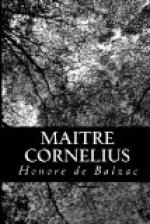Suddenly all the bells in the town rang out the curfew,—a custom fallen elsewhere into desuetude, but still observed in the provinces, where venerable habits are abolished slowly. Though the lights were not put out, the watchmen of each quarter stretched the chains across the streets. Many doors were locked; the steps of a few belated burghers, attended by their servants, armed to the teeth and bearing lanterns, echoed in the distance. Soon the town, garroted as it were, seemed to be asleep, and safe from robbers and evil-doers, except through the roofs. In those days the roofs of houses were much frequented after dark. The streets were so narrow in the provincial towns, and even in Paris, that robbers could jump from the roofs on one side to those on the other. This perilous occupation was long the amusement of King Charles IX. in his youth, if we may believe the memoirs of his day.
Fearing to present himself too late to the old silversmith, the young nobleman now went up to the door of the Malemaison intending to knock, when, on looking at it, his attention was excited by a sort of vision, which the writers of those days would have called “cornue,”—perhaps with reference to horns and hoofs. He rubbed his eyes to clear his sight, and a thousand diverse sentiments passed through his mind at the spectacle before him. On each side of the door was a face framed in a species of loophole. At first he took these two faces for grotesque masks carved in stone, so angular, distorted, projecting, motionless, discolored were they; but the cold air and the moonlight presently enabled him to distinguish the faint white mist which living breath sent from two purplish noses; then he saw in each hollow face, beneath the shadow of the eyebrows, two eyes of porcelain blue casting clear fire, like those of a wolf crouching in the brushwood as it hears the baying of the hounds. The uneasy gleam of those eyes was turned on him so fixedly that, after receiving it for fully a minute, during which he examined the singular sight, he felt like a bird at which a setter points; a feverish tumult rose in his soul, but he quickly repressed it. The two faces, strained and suspicious, were doubtless those of Cornelius and his sister.
The young man feigned to be looking about him to see where he was, and whether this were the house named on a card which he drew from his pocket and pretended to read in the moonlight; then he walked straight to the door and struck three blows upon it, which echoed within the house as if it were the entrance to a cave. A faint light crept beneath the threshold, and an eye appeared at a small and very strong iron grating.
“Who is there?”
“A friend, sent by Oosterlinck, of Brussels.”
“What do you want?”
“To enter.”
“Your name?”
“Philippe Goulenoire.”
“Have you brought credentials?”
“Here they are.”
“Pass them through the box.”




